Text
Thoughts on the Irish Gods
I have made a family tree of the gods after reading through the LGE. It is a tricky task since the different accounts of the gods can contradict each other, but it was doable.
I have no idea if Ernmas is daughter to Nuada's grandson or daughter of Nuada's grandfather for example.
And the figure(s) Delbeath, Turienn, and Tuirill Biccero are confusing... are they different men? The same?
Plus, one of the Morrigan sisters, Morrigu, is said to be the same woman as Anand or Danand, but the accuracy of this is debated, and the verse text of the LGE suggests Morrigu is separate than Danand.
It's cool to see the different branches of the family tree and how they interact with each other.
For example, I saw Lugh in conflict with Ogma's decedents and the Dagda's decedents. There is also incest and accounts of who killed whom.
The women of the tuatha are made up of sorceress warrior women, healers, women associated with the domestic world/farming, and figures of sovereignty. According to one verse, one woman, Ethniu/Ethliu is mother to seven of the major gods. Wikipedia (yeah I know...) says the name Eithne, another name for her, means kernel or grain.
A simplification: I saw a bunch of gods who are brothers with their decedents come to Ireland, take it from another tribe. They were betrayed by one of their own, fought and defeated another tribe, and by then most of the brothers were dead and their kids all married and killed each other.
#irish mythology#tuatha de danann#irish myth#pagan#irish lore#mythology#celtic myth#the morrigan#dagda#goddess#witch#witchblr#pagan gods
26 notes
·
View notes
Text
The Real Mother of the Gods
Random internet articles will tell you how Danu is the mother of the Irish gods, like some overarching ancestral figure.
When reading the actual lore, this idea is pretty false. There may be a Danand, mother to three gods, but no great Danu. This is even argued, as a better translation may reveal they are three gods of skill, the word for skill confused or made into the name of a goddess.
While I was reading the verse portion of the Lebor Gabála Érenn volume 4 (LGE) on the tuatha, I discovered something interesting. Ethniu is named as mother to seven of the major gods: Luichtaine, Creidne, Goibnu, Dian Cecht, Nuada, Dagda, and Lugh.
Additionally, in the Cath Maige Tuired, if I am not mistaken, Ogma is named as one of her sons.
It is a shame this isn't discussed more. The prose text of the LGE does not mention this either. It mostly recounts who is the father to whom.
Ethniu is daughter of Balor, a Fomorian king. The Fomorians share ancestors with the gods, and live on islands close to Ireland.
Folk or fairy tales tell how Balor heard a prophecy that his grandson would kill him, so he locked Ethniu up, surrounded only by women, until a man looking for a magic cow Balor stole sneaks in and she gets pregnant with Lugh.
In the LGE it is mentioned she is given to Cian, a god, in marriage and they have Lugh.
But turning to the verse texts in the LGE, here is the small passage:
"They were powerful against their firm conflict,
The seven lofty great sons of Ethliu.
Dagda, Dian Cecht, Credne the wright,
Luichne the carpenter, who was an enduring.
consummate plunderer,
Nuada who was the silver-handed,
Lug Mac Cein, Goibninn the smith."
(The names have variations of how they're spelled in the LGE.)
Her first six sons are over different skills/roles, a smith, wright, carpenter, a physician, a king, and a druid/wizard/warrior, but her son Lugh possess all of the skills and becomes the king of the gods after Nuada’s death.
I think Ethniu/Ethliu should get the credit for being mother of the gods.
#irish mythology#tuatha de danann#irish myth#pagan#irish lore#celtic myth#goddess#irish gods#witchblr#myth#mythology#gods#goddesses#lore#folklore#irish literature
34 notes
·
View notes
Text
The Irish Gods pt 2
During the war against Bres and the Fomorians, Lugh had a conflict with 3 brothers. They were the 3 sons of Turien. These 3 brothers killed Lugh's father. As punishment, Lugh sent them on a voyage to retrieve magical treasures. The brothers ended up dying, and Lugh refused to let them be healed by one of the magic treasures.
After the war, the Fomorians steal the Dagda’s harp. Lugh, the Dagda, and another god go to retrieve it. The Dagda calls the harp to him. It flies off the wall and hits and kills some Fomorians. He plays the harp, and it puts the Fomorians to sleep.
Eventually, Lugh tricks Bres and kills him. Lugh had fake cows made and filled the utters with bogwater. Bres was under a stipulation where he had to drink whatever was offered to him. Lugh offered Bres a drink from the "cows." Bres drank, got sick, and died.
Next, Lugh kills the Dagda’s son, Cermait. (Cermait and Lugh's wife had slept together). The Dagda preserved his son's body and wandered around until he found and stole a staff that resurrected Cermait. This staff brought life with one end and death with the other.
Lugh was eventually killed by the Dagda’s grandson, Mac Cecht.
The Dagda was king for a while until he died of a wound he received in the battle with the Fomorians. Next, Delbeath, son of Ogma was made king until he was killed by a king from over the sea. His son became king until he was killed by a man associated with a creek.
The Dagda’s 3 grandsons, Mac Cecht, Mac Cuill, and Mac Gréine share the kingship of Ireland.
The Milesians, a tribe from Spain, invade and conquer the gods, and the 3 kings and their wives are killed in battle. Some of the invaders promised to name the land after the 3 wives. One of the wives was Eriu, Bres' mother by Elatha.
The gods go to live in the sidhe mounds or "the land of promise," a type of otherworld.
#irish mythology#tuatha de danann#irish myth#pagan#irish lore#celtic myth#goddess#the morrigan#irish gods#witchblr#part two
4 notes
·
View notes
Text
The Irish Gods pt. 1
After reading several texts, I've painted this picture of the Irish gods.
There is the war god Net. His descendants procreate with his granddaughter Ethniu. She has 7 sons: the smith, the carpenter, the wright, the physician (Dian Cecht), the king (Nuada), the druid warrior (the Dagda), and the god of every skill (Lugh).
Elatha, Net's grandson, is a Fomorian king. He is father to Bres, the Dagda, and Ogma the champion; though, one text makes Ogma the son of Ethniu.
The gods lived in islands in the northern parts of the world where they learned all their magic, sciences, and art.
They invaded Ireland. They sailed there, and clouds shielded their arrival.
They had four treasures: the cauldron that everyone left satisfied from, the spear no one could defeat, the sword that nothing could escape from, and the stone of destiny that shouted when the true king of the land put his foot on it.
They battled the Firbolg, the existing inhabitants, for Ireland. The Morrigan and her sisters cast clouds and rain of fire and blood over the Firbolg. The gods defeat the Firbolg. (The Firbolg and gods have common ancestors).
Nuada loses his hand in battle. A blemished king can't rule. Bres is made king in hopes his Fomorian side would render the Fomorians under the gods' power.
The smith god made a silver hand. Dian Cect attached it to Nuada, making a working silver hand.
One text says Bres was a bad king. He chose the Fomorian side of his family. He made the Dagda build forts and Ogma carry wood. There was no food or drink at his court. The gods were taxed heavily, and all their wealth went to the Fomorians.
Miach, Diancecht's son, restores Nuada’s real flesh hand, unburying it, attaching it, and restoring it completely. Nuada is able to be king again. Diancecht was jealous of Miach, so he killed him. From his grave grew healing herbs. His sister gathered the herbs on a cloth, but Dian Cecht mixed them, and their healing knowledge was lost.
A poet made a satire about Bres. It embarrassed him and brought him dishonor. The gods told him they wanted to remove him as king. He went to his dad Elatha for help to battle gods. Elatha refused. Bres went to the Fomorian Balor for help. (Balor is the war god Net's son).
Meanwhile, Balor's grandson, Lugh, son of Ethniu and the god Cian (Dian Cecht’s son) comes to the god's court. They don't let anyone in without a skill. Lugh was the only one that had all the skills put together. They let him in. He was stronger than Ogma, and Nuada put him in charge of the war.
The Dagda slept with the Morrigan at the mouth of a river. Afterward, she gave him war intel and told him her plan: to kill one of the Fomorians. (Some texts say the Dagda and Morrigan are married to each other).
The Dagda’s daughter, Brigid, is married to Bres. She owns the king of the cows and king of the pigs. Her son with Bres is a spy. The son is killed by the gods, and Brigid is the first to cry and scream in mourning in Ireland.
The war was on. Dian Cecht and his kids made a healing well, filling the water with herbs. Anyone wounded who bathed in it was healed. Only people with their head cut off or brains bashed in could not be healed. The smith god and his brothers magically repaired the gods' weapons by the next day of battle.
Lugh defeated Balor in battle. Balor had an "evil eye." Whatever it looked upon was destroyed. Lugh hit the eye with his sling shot. The eye shot through the back of Balor's skull and killed several many Fomorians.
They spared Bres' life if he agreed to teach them the times to plant and harvest.
Nuada had died in battle, and Lugh was made king.
See pt. 2
#irish mythology#tuatha de danann#irish myth#pagan#irish lore#celtic myth#goddess#the morrigan#irish gods#witchblr
26 notes
·
View notes
Text
The Real Mother of the Gods
Random internet articles will tell you how Danu is the mother of the Irish gods, like some overarching ancestral figure.
When reading the actual lore, this idea is pretty false. There may be a Danand, mother to three gods, but no great Danu. This is even argued, as a better translation may reveal they are three gods of skill, the word for skill confused or made into the name of a goddess.
While I was reading the verse portion of the Lebor Gabála Érenn volume 4 (LGE) on the tuatha, I discovered something interesting. Ethniu is named as mother to seven of the major gods: Luichtaine, Creidne, Goibnu, Dian Cecht, Nuada, Dagda, and Lugh.
Additionally, in the Cath Maige Tuired, if I am not mistaken, Ogma is named as one of her sons.
It is a shame this isn't discussed more. The prose text of the LGE does not mention this either. It mostly recounts who is the father to whom.
Ethniu is daughter of Balor, a Fomorian king. The Fomorians share ancestors with the gods, and live on islands close to Ireland.
Folk or fairy tales tell how Balor heard a prophecy that his grandson would kill him, so he locked Ethniu up, surrounded only by women, until a man looking for a magic cow Balor stole sneaks in and she gets pregnant with Lugh.
In the LGE it is mentioned she is given to Cian, a god, in marriage and they have Lugh.
But turning to the verse texts in the LGE, here is the small passage:
"They were powerful against their firm conflict,
The seven lofty great sons of Ethliu.
Dagda, Dian Cecht, Credne the wright,
Luichne the carpenter, who was an enduring.
consummate plunderer,
Nuada who was the silver-handed,
Lug Mac Cein, Goibninn the smith."
(The names have variations of how they're spelled in the LGE.)
Her first six sons are over different skills/roles, a smith, wright, carpenter, a physician, a king, and a druid/wizard/warrior, but her son Lugh possess all of the skills and becomes the king of the gods after Nuada’s death.
I think Ethniu/Ethliu should get the credit for being mother of the gods.
#irish mythology#tuatha de danann#irish myth#pagan#irish lore#celtic myth#goddess#irish gods#witchblr
34 notes
·
View notes
Text
I just realized I hadn't read any authentic source on the Tuatha De Danann moving to the sidh mounds after their defeat or Mannanan making them invisible. I tried looking in the LGE volume 5 but not seeing much. What texts have this???
#irish mythology#tuatha de danann#irish myth#pagan#irish lore#the morrigan#witchblr#irish paganism#irish polytheism#celtic polytheism
8 notes
·
View notes
Text
The Morrigan makes it rain fire and blood...
"It was then that Badb and Macha and Morrigan went to the Knoll of the Taking of the Hostages, and to the Hill of Summoning of Hosts at Tara, and sent forth magic showers of sorcery and compact clouds of mist and a furious rain of fire, with a downpour of red blood from the air on the warriors’ heads; and they allowed the Fir Bolg neither rest nor stay for three days and nights." -1st Battle of Moytura
#irish mythology#tuatha de danann#irish myth#pagan#irish lore#goddess#the morrigan#wicca#witchblr#irish paganism
47 notes
·
View notes
Text
The Morrigan's Parents
One translation of the Lebor Gabala Erenn regarding the Morrigan's parentage...
"Badb and Macha, greatness of wealth, Morrigu — springs of craftiness, sources of bitter fighting were the three daughters of Ernmas.” -LGE
“The seven sons of Delbaeth…were Fiachra, Ollam, Indui, Brian, Iucharba, Iuchair and Elcmar of the Brug. His three daughters were Bodb, Macha, and Morrigu.” -LGE
#irish mythology#tuatha de danann#irish myth#pagan#irish lore#witchblr#celtic polytheism#the morrigan#goddess#irish paganism#irish goddesses
35 notes
·
View notes
Text
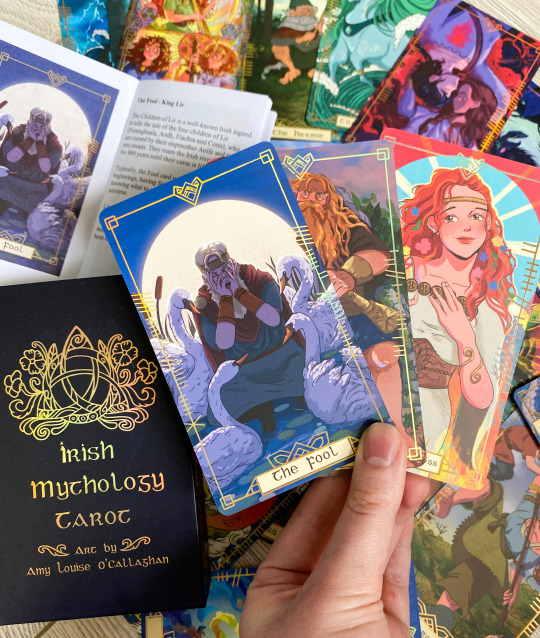
For any tarot/mythlogy fans, I designed a major arcana deck last year year featuring various figures and stories from Irish mythology!
You can buy it here if you're interested
91 notes
·
View notes
Text
Thank you so much for sharing all that great information. That really helped the topic make more sense to me, and it educated me further. I appreciate it.
The Lia Fáil
The Lia Fáil is one of the treasures of the Tuatha de Danann. It cried out under the foot of whoever was king.
Currently at Tara is this stone called Lia Fail, but it's just a stone from a ditch set up as a monument to some soldiers, if memory serves.
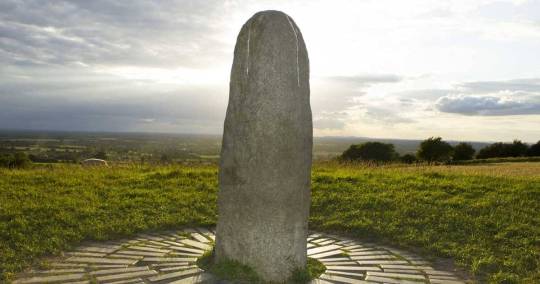
I like to imagine the Lia Fáil would have looked like medieval coronation stones, as shown below.
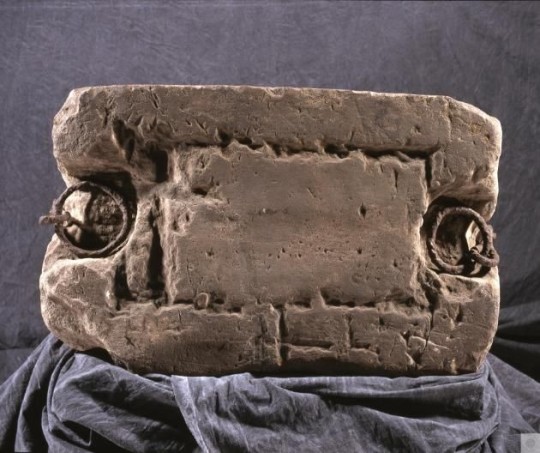

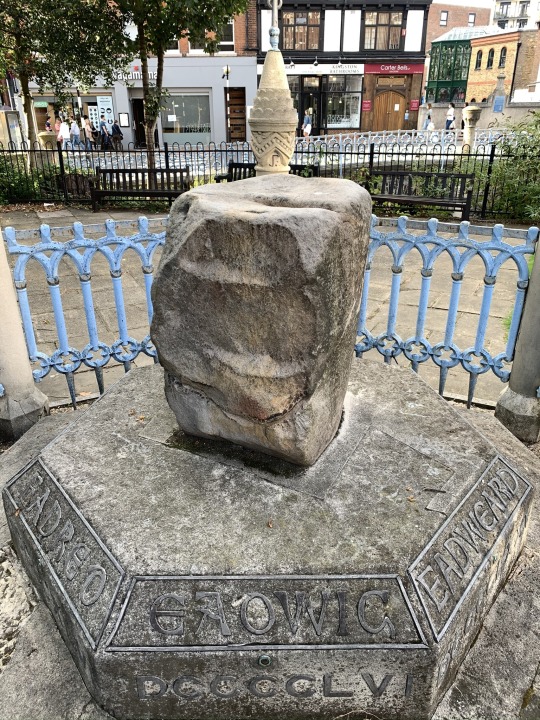
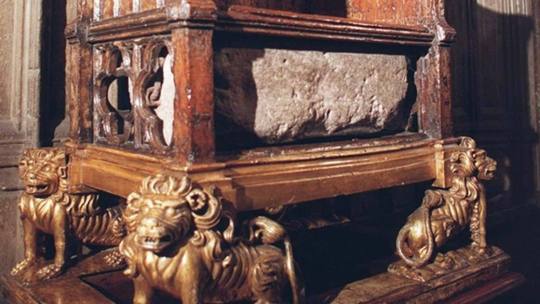
43 notes
·
View notes
Text
The Lia Fail from the story isn't real though... because its a fictitious story... but yea the story takes place before medieval times so it wouldn't look like one, but isn't the story involving the Lia Fail written or recorded in medieval times anyway though? And the current phallic Lia Fail is a more current monument. Plus the tale says it cries out under their foot, so I would imagine it's shape would accommodate that. Plus there are texts, stories, and writers who have equated the Lia Fail with the Scottish stone of scone (a coronation stone).
The Lia Fáil
The Lia Fáil is one of the treasures of the Tuatha de Danann. It cried out under the foot of whoever was king.
Currently at Tara is this stone called Lia Fail, but it's just a stone from a ditch set up as a monument to some soldiers, if memory serves.

I like to imagine the Lia Fáil would have looked like medieval coronation stones, as shown below.




43 notes
·
View notes
Photo
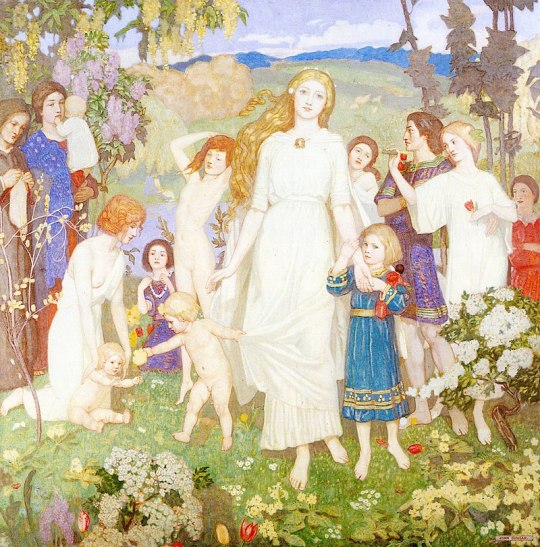
The Coming of Bride (1917) by John Duncan
Brigid (Irish: [ˈbʲɾʲɪjɪdʲ, ˈbʲɾʲiːdʲ]; meaning ’exalted one’ from Old Irish), Brigit or Bríg is a goddess of pre-Christian Ireland. She appears in Irish mythology as a member of the Tuatha Dé Danann, the daughter of the Dagda and wife of Bres, with whom she had a son named Ruadán.
She is associated with wisdom, poetry, healing, protection, blacksmithing and domesticated animals. Cormac’s Glossary, written in the 9th century by Christian monks, says that Brigid was “the goddess whom poets adored” and that she had two sisters: Brigid the healer and Brigid the smith. This suggests she may have been a triple deity. She is also thought to have some relation to the British Celtic goddess Brigantia.
Saint Brigid shares many of the goddess’s attributes and her feast day, 1 February, was originally a pagan festival (Imbolc) marking the beginning of spring. It has thus been argued that the saint is a Christianization of the goddess; a form of syncretism.
#Brigid#irish mythology#tuatha de danann#irish paganism#pagan#irish lore#irish myth#irish goddesses#irish gods#celtic myth#celtic mythology
122 notes
·
View notes
Text
Issue with the portrayal of the Fomorians
I wish primary sources on the Fomorians were more available.
According to the internet and some books...😅... they are said to dwell under the sea, come from under the earth, be giants or monsters, and are compared to the Titans/purposed to be the gods before the Tuatha. They're called sea raiders or pirates.
But in the LGE, First Battle of Moytura, and Cath Maige Tuired they seem like regular people like the Tuatha de Danann.
Where did all these ideas of their nature and appearance come from?
They just seem like a regular tribe living on Islands off the coast of Ireland.
Not to mention, in the LGE, they are portrayed as having the same ancestors as the Tuatha de Danann.
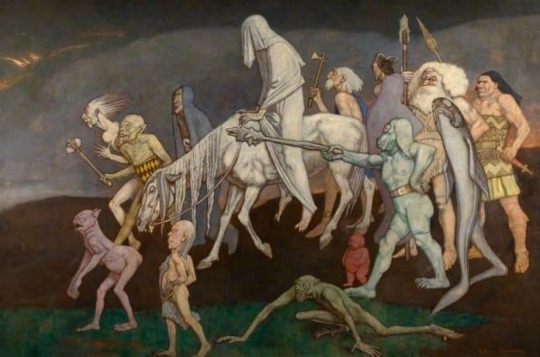
Image credit: "The Fomors (or The Power of Evil Abroad in the World)” by John Duncan
#irish mythology#tuatha de danann#pagan#irish myth#irish lore#mythology#paganism#celtic myth#fomorian#fomorians
43 notes
·
View notes
Text
Want to read about the Irish gods and goddesses? I whole heartedly recommend the author Morgan Daimler. Their books are so well researched and a great introduction to the Irish deities.
If you don't want to support Amazon, at least look at Morgan's book list here and buy the books elsewhere if available.
#witch#pagan#goddess#celtic mythology#celtic myth#tuatha de danann#paganism#irish mythology#irish myth#irish lore#mythology#the morrigan#brigid#dagda#lugh#irish polytheism
89 notes
·
View notes
Text
Dían Cécht
"11 In that battle there the arm of Nuada was hewn off...Dían Cécht[9] the physician put on him a silver arm with the movement of any other arm"
"35 After that Dían Cécht buried Míach and three hundred and 65 herbs grew up through the burial place, under the full number of his joints and fibers. Afterwards Airmed[29] unfolded her mantle and separated the herbs there according to their proper order. Dían Cécht came and mixed the herbs, so that no one knows the healing properties."
"98 'And you, oh Dían Cécht,' said Lugh, 'What power can you control?' 99 'Not hard,' he said: 'Any man who is injured there, unless his head is cut from him, or except if the membrane of his brain or his spinal cord is cut, he will be whole in the battle the following day.'" [Via an enchanted well]
-Cath Maige Tuired, English translation by Morgan Daimler

#irish mythology#tuatha de danann#pagan#irish myth#irish lore#mythology#paganism#celtic myth#dian cecht#morgan daimler#cath maige tuired
20 notes
·
View notes
Text
The Four Jewels of the Tuatha Dé Danann
From The Yellow Book of Lecan
"No battle was maintained against the spear of Lug or against him who had it in his hand. No-one escaped from the sword of Nuada after he had been wounded by it, and when it was drawn from its warlike scabbard, no-one could resist against him who had it in his hand. Never went an assembly of guests away unsatisfied from the caldron of the Dagda. And the Lia Fail, which is at Tara, never spoke except under a king of Ireland."
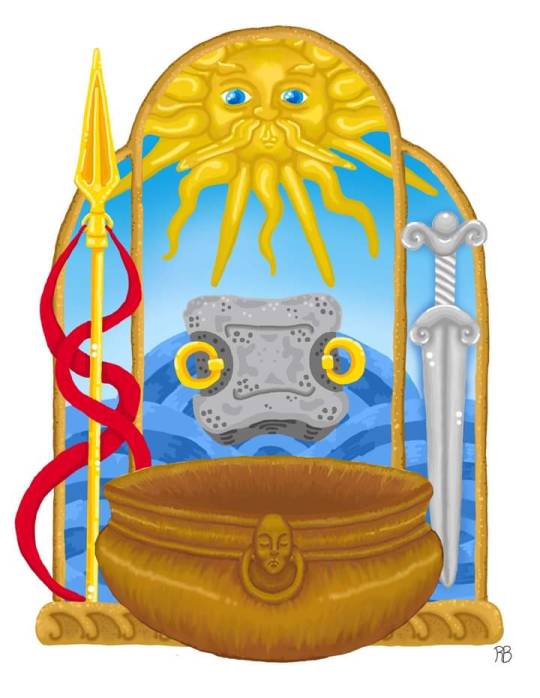
Art by me, Reed B
#irish mythology#tuatha de danann#pagan#irish myth#irish lore#mythology#paganism#goddess#celtic myth#dagda#lugh#nuada
57 notes
·
View notes
